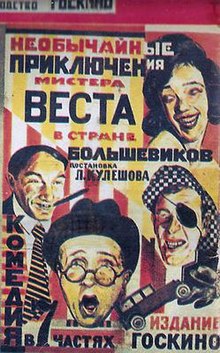The Extraordinary Adventures of Mr. West in the Land of the Bolsheviks
| The Extraordinary Adventures of Mr. West in the Land of the Bolsheviks | |
|---|---|
 Film poster | |
| Directed by | Lev Kuleshov |
| Written by |
|
| Starring | |
| Cinematography | |
| Edited by | |
| Music by | Benedict Mason (1980s re-release) |
Release date | 27 April 1924 |
Running time | 94 min. |
| Country | Soviet Union |
| Languages | |
The Extraordinary Adventures of Mr. West in the Land of the Bolsheviks (Russian: Необычайные приключения мистера Веста в стране Большевиков, romanized: Neobychainye priklyucheniya mistera Vesta v strane bolshevikov) is a 1924 comedy film by Soviet director Lev Kuleshov.[1] It is notable as the first Soviet film that explicitly challenges American stereotypes about Soviet Russia.[2]
Plot[]
A broad satire of American ignorance of the Soviet Union, the film centers on the misadventures of the naive Harold Lloyd-esq American, John West (Porfiri Podobed). West is a YMCA president from the Cleveland suburb of Brecksville, Ohio who is planning a trip to the newly founded USSR to spread the idea of the YMCA. His wife, Madge, is worried that Russia is full of savage Bolsheviks who wear primitive rags and fur for clothing, as depicted in American magazines. He takes along his cowboy friend Jeddie (Boris Barnet) for protection and as a companion.
However, on arriving in the USSR his briefcase is stolen, he gets separated from Jeddie and he falls into the hands of a group of thieves, including a run-down Countess (Aleksandra Khokhlova), who masquerade as counter-revolutionaries. The thieves play on West's fears and engineer his abduction by crooks dressed up as caricature Bolshevik "barbarians." The thieves then "rescue" West from the clutches of these fictional Bolsheviks, extorting thousands of dollars from him along the way.
In the end, it is the real Bolshevik police who rescue West, rather than his friend Jeddie (who has hooked up with an American girl living in Moscow). West then takes a sightseeing tour of Moscow, where he sees that the Soviet government did not destroy all cultural landmarks, such as Moscow University and the Bolshoi Theater, as the thieves suggested. The film culminates in Mr. West watching a military parade with the policeman and concluding that the American view of the Soviet Union is wrong. He telegraphs his wife instructing her to hang a portrait of Lenin in his study.
Credited cast[]
- Porfiri Podobed - Mr. John West
- Boris Barnet - Jeddy - the cowboy
- Aleksandra Khokhlova - The 'Countess'
- Vsevolod Pudovkin - Zhban
- Sergey Komarov - The One-Eyed Man
- Leonid Obolensky - The Dandy
- - Ellie - the American girl
- - Senka Svishch
- - Crook
References[]
- ^ Jay Leyda (1960). Kino: A History of the Russian and Soviet Film. George Allen & Unwin. pp. 171–173.
- ^ University of Pittsburgh (2003). "RusFilm 2003". Retrieved 1 November 2008.
External links[]
- 1924 films
- Soviet films
- 1924 comedy films
- Soviet comedy films
- Russian comedy films
- Russian films
- Soviet propaganda films
- Soviet silent feature films
- Anti-Americanism
- Films directed by Lev Kuleshov
- Soviet Union–United States relations
- Soviet black-and-white films
- Russian black-and-white films
- Russian silent feature films
- Films set in Moscow
- Films set in Ohio
